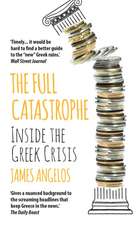Medea, Magic, and Modernity in France: Stages and Histories, 1553–1797
Autor Amy Wyganten Limba Engleză Hardback – 28 sep 2007
Preț: 1055.51 lei
Preț vechi: 1287.22 lei
-18% Nou
Puncte Express: 1583
Preț estimativ în valută:
201.97€ • 211.44$ • 167.12£
201.97€ • 211.44$ • 167.12£
Carte tipărită la comandă
Livrare economică 05-19 aprilie
Preluare comenzi: 021 569.72.76
Specificații
ISBN-13: 9780754659242
ISBN-10: 0754659240
Pagini: 228
Dimensiuni: 156 x 234 x 14 mm
Greutate: 0.48 kg
Ediția:1
Editura: Taylor & Francis
Colecția Routledge
Locul publicării:Oxford, United Kingdom
ISBN-10: 0754659240
Pagini: 228
Dimensiuni: 156 x 234 x 14 mm
Greutate: 0.48 kg
Ediția:1
Editura: Taylor & Francis
Colecția Routledge
Locul publicării:Oxford, United Kingdom
Notă biografică
Amy Wygant teaches early modern French literature and culture at the University of Glasgow and publishes on tragedy, witchcraft, opera, and psychoanalysis. She is the editor of Seventeenth-Century French Studies and a co-founder of Women in French in Scotland (WIFIS).
Cuprins
Acknowledgments; Introduction: Stages and Histories; Chapter 1 Glamour and its Discontents; Chapter 2 Medean Renaissance; Chapter 3 Of Glammatology; Chapter 4 The Question of Illusion; Chapter 5 Narcissus, and the Devils of Loudun; Chapter 6 The Magic of Modernity; Postscript;
Recenzii
’Wygant’s writing is lively and clever. She converses with a dizzying variety of critics and generously references the contributions of colleagues in the field. ...Wygant’s book is of prime importance for scholars and students of early modern French theater, witchcraft theory, and mythological adaptations, while her methodology will stimulate those engaged in psychoanalytical approaches to early modern literature and culture.’ H-France
Descriere
Revealing the surprising trajectory of our contemporary obsession with magic, Amy Wygant here follows the figure of Medea, the great antique witch and child-murderess, through her appearances on the early modern French stage from La Péruse to Corneille to Cherubini, by way of medical treatises, visual images, cultural practices, and poetics. This cross-disciplinary study shows that Medea is our mirror, and her story is the story of cultural performance.










